IOS book “Mohammad Nejatullah Siddiqi: Life and Contributions to Islamic Economics” released
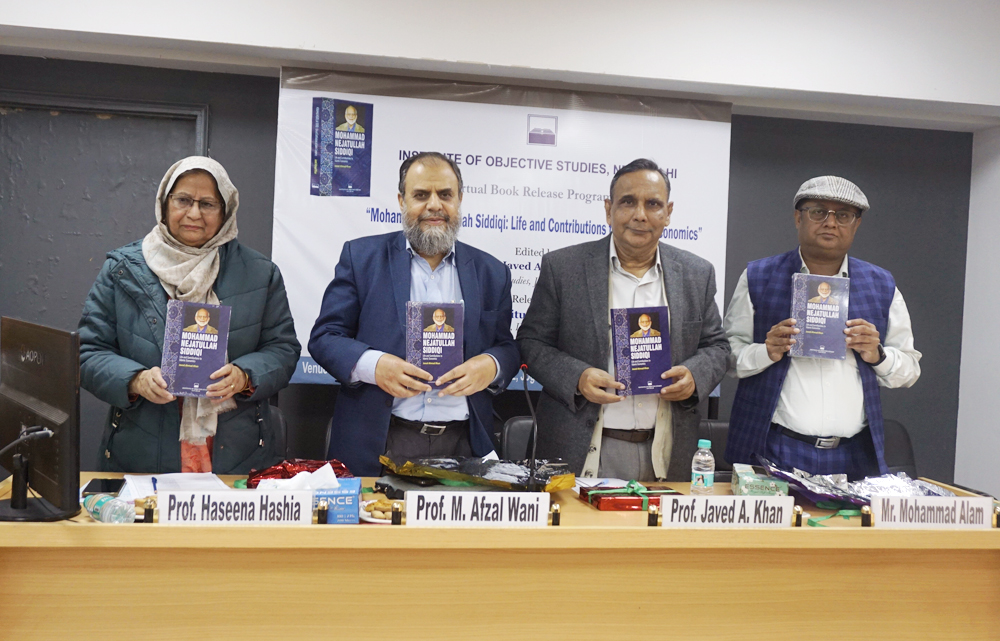
IOS book “Mohammad Nejatullah Siddiqi: Life and Contributions to Islamic Economics” released
New Delhi: The book “Mohammad Nejatullah Siddiqi: Life and Contributions to Islamic Economics” was released at a virtual programme organised by the Institute of Objective Studies on December 21, 2024.
It may be recalled that the book has been edited by Prof. Javed Ahmad Khan, ex-professor at the Centre for West Asian Studies, Jamia Millia Islamia, New Delhi.
The programme began with the recitation of a Quranic verse.
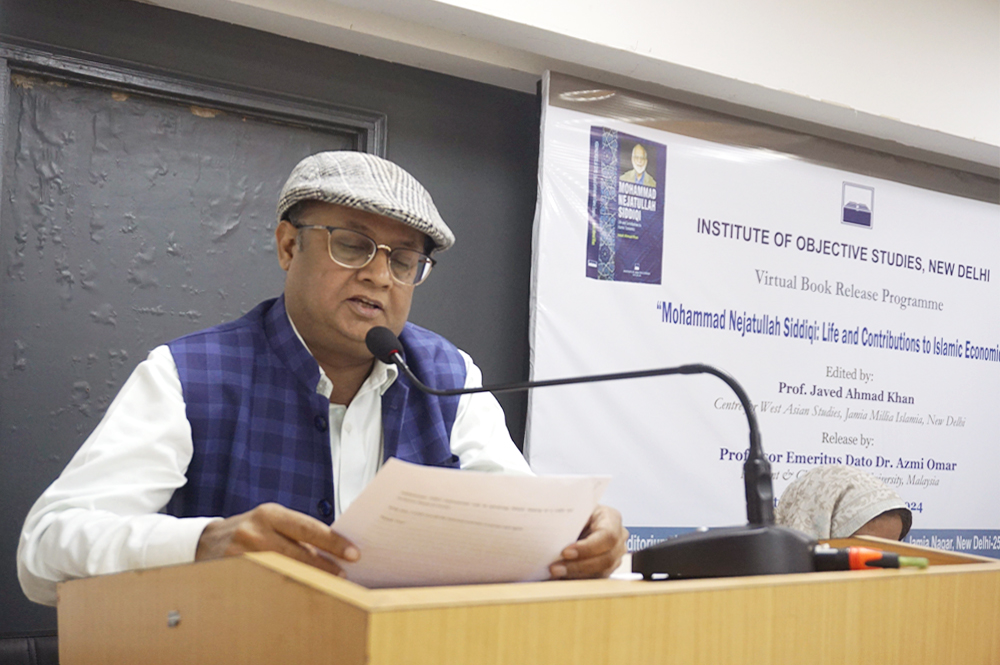
In his welcome address, secretary general of the IOS, Mr. Mohammad Alam, highlighted the activities of the institute. He said that established in 1986, the institute had so far organised more than 1300 programs at national and international level, and published 450+ books on various subjects. It was engaged in undertaking research and surveys on the status of minorities and socially and economically deprived sections. Referring to the book, he said that it was a prestigious publication of the institute. The book focused on the contribution of the noted scholar of Islamic banking and finance, Prof. Mohammad Nejatullah Siddiqi. His books in English were recognized nationally and internationally. “The book is a significant contribution to understanding the life and legacy of Prof. Mohammad Nejatullah Siddiqi. It holds immense relevance for the contemporary Muslim world,” he added.
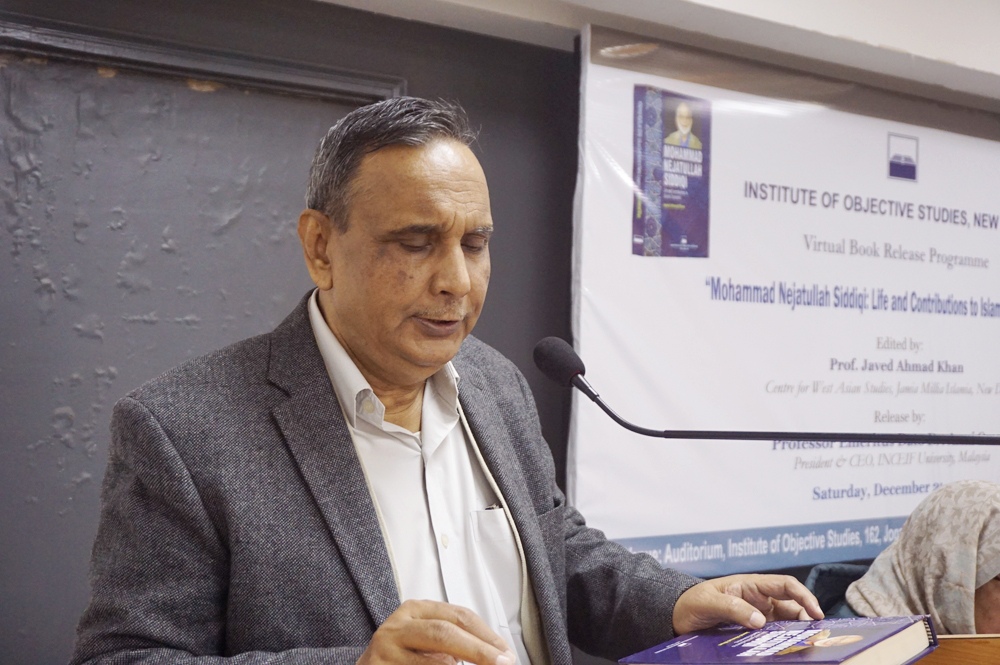
Speaking about the book, Prof. Javed Ahmad Khan, editor, observed that the book had been published by the IOS on the contribution of Late Prof. Siddiqi. It was the idea of Dr. Mohammad Manzoor Alam, chief patron and the founding chairman of the IOS, to visualize an international conference on the contributions of Prof. Siddiqi. Prof. Siddiqi theorized in 1960s the Islamic banking and finance without interest. He was the most prominent social scientist and economist of Independent India. He said that the book was worth reading. It was a collection of essays on various aspects of Islamic banking and finance as propounded by Prof. Siddiqi. He was meticulous about training young students. He stressed the need for more research on his ideas which had not been covered in the book. Prof. Siddiqi also laid emphasis on educating madrasa students in financial literacy and development. He said that Prof. Siddiqi embodied three core values – mental clarity, modesty and family. His vision for Islamic economics was not just theoretical, but aimed at practical global development.
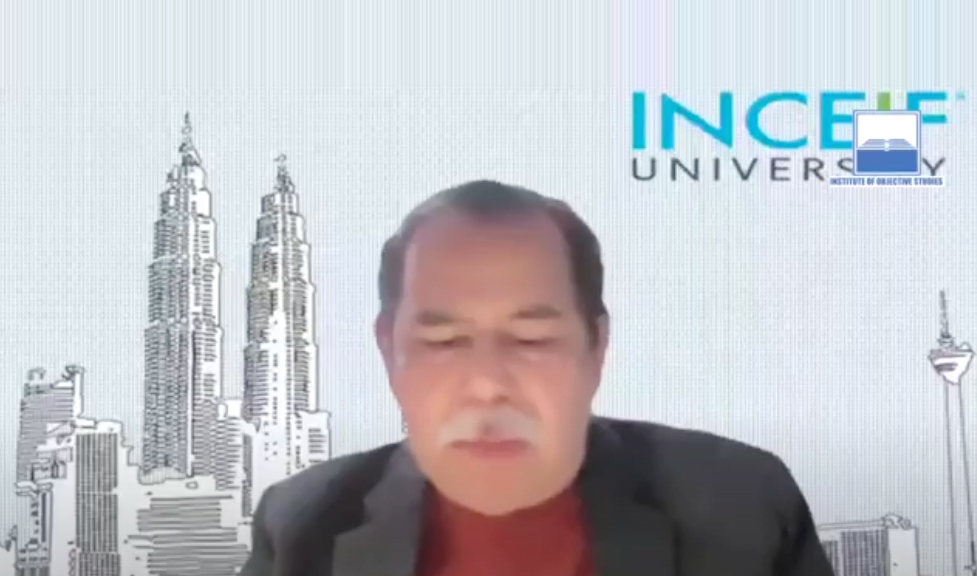
Prof. Emeritus Dato Dr. Azmi Omar, president and CEO of INCEIF University, Malaysia, released the book virtually. Speaking on the occasion, he said that Prof. Siddiqi’s contribution was not only in Islamic economics, but also ethics in economics. He was a unique individual and was ahead of his times. He was pioneer in Islamic economics based on Islamic principles. Highlighting the enduring relevance of Prof. Siddiqi’s ideas, he said that in today’s world marked economic inequality and moral crisis, his theories offered a beacon of hope. His legacy underscored the profound importance of Islamic principles in addressing modern challenges. He theorized Islamic economics in the context of Islamic thought. His inter-disciplinary approach to economics expanded the scope of Islamic economics. He also raised the question of poverty and the foundational area in Islamic economics and finance. A lot of research on Islamic economics and finance was still needed. As the founder of modern Islamic economics, he would always be remembered for his scholarly contributions and unwavering dedication to building a better world, Dr. Omar added.

In his key-address, CEO of Fajr Capital Group, Dubai, UAE, Dato Iqbal Ahmed Khan, reflected on his personal relationship with Prof. Nejatullah Siddiqi during his days at Aligarh Muslim University, Aligarh. He said that Prof. Siddiqi used to discuss Islamic economics even in his university days. During Emergency in 1975, he was among the intellectuals imprisoned for their opinions. He held that his father, Mr. Iftikhar Ahmed Khan strongly supported Prof. Siddiqi during those difficult days. His understanding of Islamic economics and finance was very deep. He was in the service of humanity and faith. Consultation with Prof. Siddiqi impacted his life. His father visited Prof. Siddiqi in prison during the Emergency. His ground-breaking ideas and thoughts inspired a generation of scholars. He observed that according to Prof. Siddiqi, faith and reason could work together. His ideas were rooted in Islamic faith. He said that he was doing a small service to fulfil Prof. Siddiqi’s dream of Islamic finance.
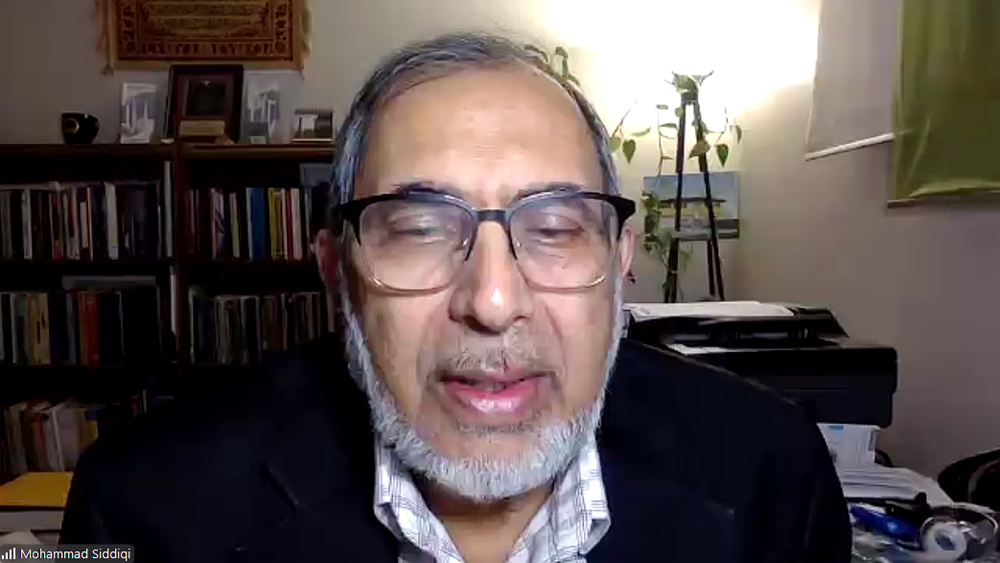
Another key speaker, Dr. Mohammad Ahmadullah Siddiqi, professor emeritus of Journalism and Public Relations, Western Illinois University, USA, and nephew of Prof. Mohammad Nejatullah Siddiqi, held that he used to attend discussions at the home of his uncle, Prof. Nejatullah Siddiqi. He lived with him and saw him focusing on the people who were developing his ideas of Islamic economics. He received the guidance of his uncle. In his book, Maqasid-e-Shariah, he presented a survey of Islamic economics. He explained the just and fair economic system under Islam. He said that economic system under capitalist and socialist system, was exploitative. Both the systems did not focus on fairness and justice. He praised the establishment of an Economic Research Centre in Aligarh as one of Prof. Siddiqi’s notable achievements. He hoped that Prof. Siddiqi’s legacy and scholarship would continue to inspire scholars in the field of Islamic economics and finance.
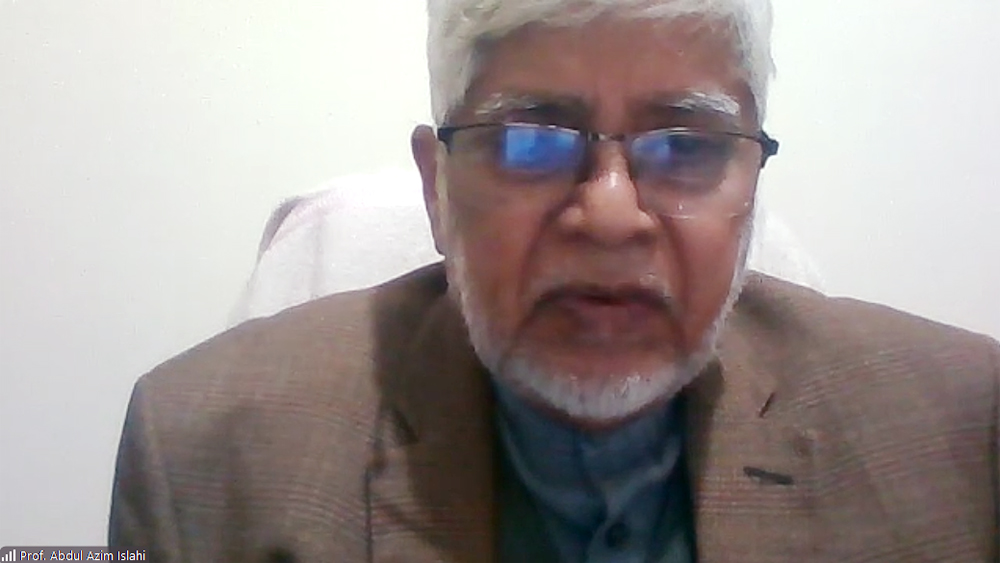
Prof. Abdul Azim Islahi, a student of Prof. Nejatullah Siddiqi and ex-professor of Islamic economics, King Abdul Aziz University, Jeddah, KSA, highlighted his deep understanding of Islamic banking and his advocacy for a non-profit economic system, and its relevance in today’s context. He described Prof. Siddiqi as a mentor whose humility, intellectual depth and commitment to reforming Islamic economics left an indelible mark on his academic journey. He said that Prof. Siddiqi was dissatisfied with the existing Islamic economic models and his drive for reformation, particularly in promoting financial literacy and economic empowerment within the Muslim community. He held that Prof. Siddiqi’s vision extended beyond theoretical frameworks to practical applications that could transform lives.
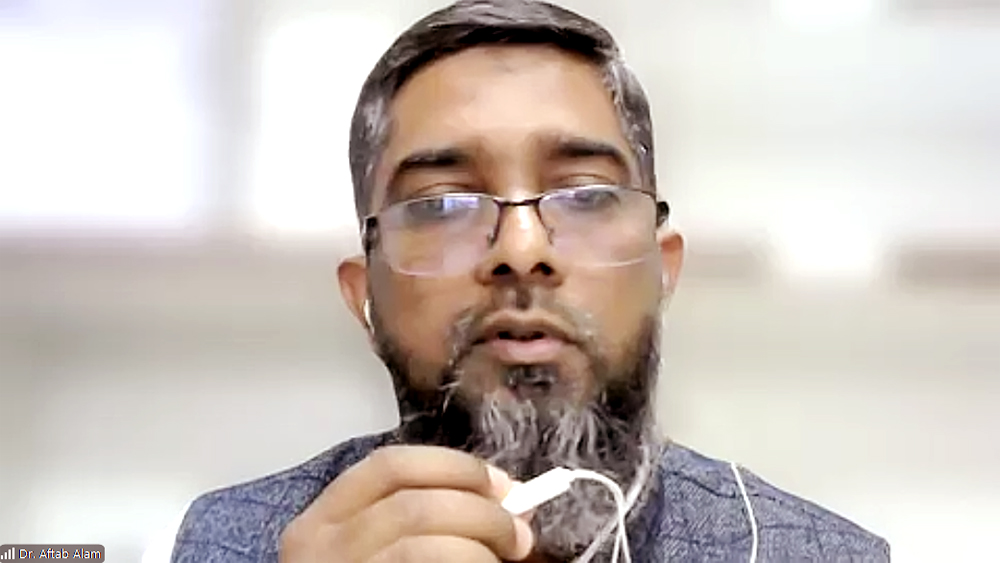
Head of the department of economics, Abida Inamdar Senior College of Arts, Science and Commerce, Pune, Dr. Aftab Alam pointed out that banking without interest was the main contribution of Prof. Mohammad Nejatullah Siddiqi. He laid down foundational principles of Islamic banking. He explained how Prof. Siddiqi meticulously dissected the intricacies of Islamic finance, offering profound insight into its principles, practices and implications. He said that prohibition of Riba (interest) in all financial transaction which was decried by Islamic law (Shariah), was one of his key themes. He remarked that Prof. Siddiqi’s work contrasted the inequalities of an interest-based economy with justice and equity embedded in Islamic finance. He also explored financial instruments like Mudharabah (profit sharing) Musharakah (joint venture) and Wakalah (agency) emphasizing their application in contemporary banking processes.
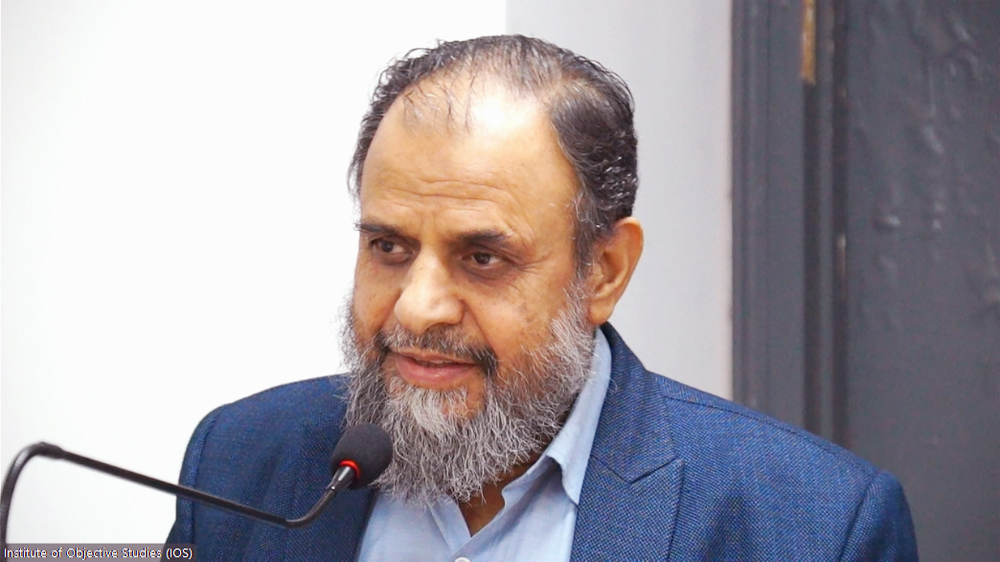
In his presidential remarks, chairman of the IOS, Prof. M. Afzal Wani, provided a historical perspective of Prof. Siddiqi’s personal and professional life. He described the challenges Prof. Siddiqi faced during the tumultuous times and his efforts to establish peace and justice. He remarked that sovereignty, polity and economy were the three pillars of Prof. Siddiqi’s Islamic economic thought in which he highlighted economic interfaces, injustice and the cultural identities. He also focused on the key factors of the book and said how he balanced the situation of Islamic economics and the welfare economy. He came up with some of the important recommendations. One of these was tackling unemployment. Islamic theorists must know how to reduce unemployment and how the resources could be used in a sustained manner. Second, managing inflation as inflation would be there, but it should be steady. Third, fostering consumer confidence and investing in banking, cooperative sector or elsewhere and using the things that made a person happy. He also called for building confidence stating that Prof. Mohammad Nejatullah Siddiqi’s work offered insights into these goals.
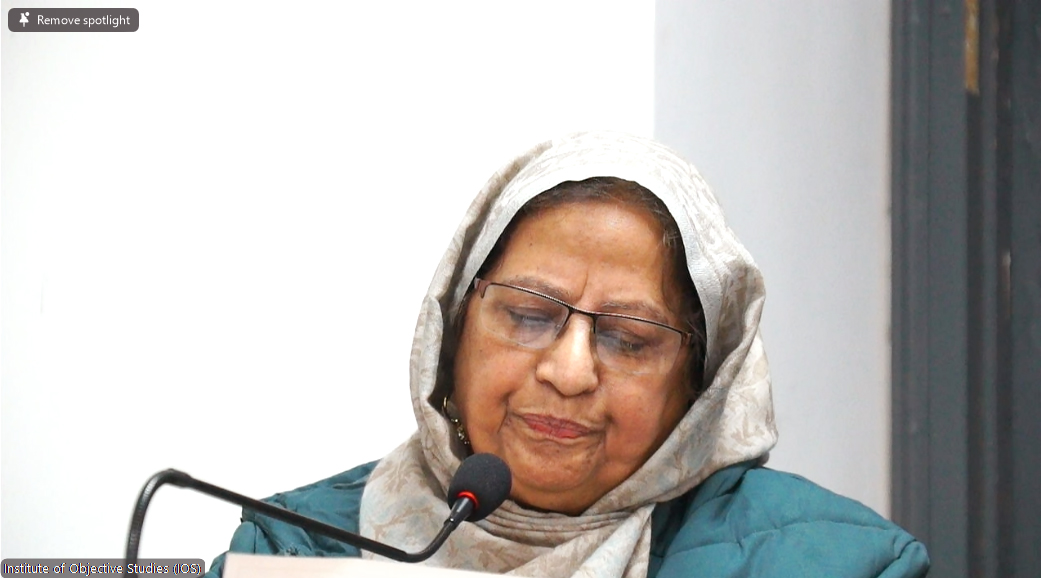
At the end, vice-chairperson of the Institute, Prof. (Ms.) Haseena Hashia, extended a vote of thanks to the participants.
Go Back